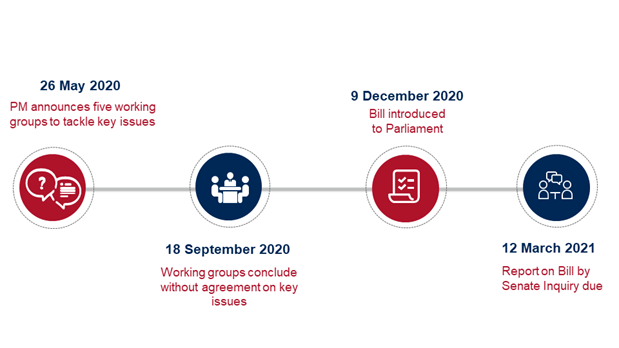In brief
The Fair Work Amendment (Supporting Australia’s Jobs and Economic Recovery) Bill 2020 (“Bill“) was introduced into Federal Parliament on 9 December 2020. If passed, this “omnibus” Bill will represent the most change to our workplace relations laws since the introduction of the Fair Work Act 2009 (Cth) (“FW Act“).
The Bill represents the culmination of a process which began (formally) in May this year, when the Prime Minister announced the establishment of five working groups. These working groups were made up of employer and employee representatives and were given the task of tackling key issues in Australia’s workplace relations system.
Contents

In Depth
The Government has marketed the Bill as part of its plan to assist Australia’s recovery from the COVID-19 crisis. While this crisis may have been a reason for the introduction for the Bill, the Bill also seeks to deal with long-standing workplace relations issues confronted by Australian employers. We expect the Bill to be hotly debated in Parliament over the coming months, with the union movement already expressing opposition to parts of the Bill.
In this article, we take an in-depth look at four aspects of the Bill which will be of particular relevance to our clients:
- casual employees;
- workplace flexibility;
- enterprise agreements; and
- compliance and enforcement.
While none of the proposed changes will come into effect until the Bill is passed, employers should keep a close eye on developments to ensure they are prepared when the time comes (perhaps in the first half of 2021).
Casual Employees Defined
The determination of what constitutes casual employment is an area that has been plagued with growing uncertainty for several years; uncertainty which has been compounded by the 2018 and 2020 decisions of the Full Federal Court in the “Skene” and “Rossato” cases.1 While the facts of the cases were quite peculiar to the labour hire industry, their perceived impact has been much broader. In particular, the cases have escalated concerns of employers in relation to the following two risks:
- first, the risk of casuals being deemed permanent employees because of the pattern of their work over a period of time; and
- second, the risk of “casuals” who are deemed permanent employees being able to “double-dip” on entitlements (that is, retain their casual loading but also receive benefits reserved for permanent staff, such as leave benefits).
In 2019, the Government passed regulations (now widely regarded as ineffective) that sought to address the issue of “casual double-dipping”. The amendments proposed by the Bill represent more significant reform, and have a number of consequences.
Significantly, the Bill creates a legislated definition of “casual employee”. The definition provides that an employee will be a casual if the employee accepts an offer of employment that is made on the basis of “no firm advance commitment to continuing and indefinite work according to an agreed pattern of work“. Whether there is no “firm advance commitment” (and, therefore, whether an employee is a casual) will be assessed at the time the offer is made.
The Bill also introduces legislated “casual conversion” provisions. These provisions would require an employer to make an offer to a casual employee to convert to permanent employment if:
- the casual has been employed for a period of 12 months; and
- for at least the last six of those months, the casual has worked a regular pattern of hours on an ongoing basis that they could continue to work as a full-time or part-time employee (without adjusting the hours).
Casuals would retain a residual right to request conversion to permanent employment in certain circumstances.
The Bill does provide for certain exceptions to this obligation, including where there are “reasonable grounds” for not making the offer.
The casual conversion provisions proposed by the Bill have been touted as a measure to increase security of employment for casuals. When considered in light of the legislated definition of “casual employee”, these measures also have a clear benefit for employers: increased certainty.
The provisions will enable an employer and an employee to agree on the employee’s status as a casual at the time of engagement, with an opportunity for conversion after 12 months. If the circumstances do not warrant conversion at that time, or if an employer has “reasonable grounds” not to offer conversion, the employee must be notified of this, and the casual arrangement will be locked in. The benefit of these provisions is that employers will be able to employ casuals with less risk that they will be deemed permanent employees because of their pattern of work over the course of their employment.
The Bill also goes a long way to correcting the failures of the “casual double-dipping” regulations passed by the Government in 2019, by requiring Courts to take casual loading into account to reduce the value of entitlements (such as leave entitlements) found owing to “casual” employees who are later deemed permanent. This will reduce liabilities for back pay that may arise in circumstances where employees have been misclassified. This is another win for employers.
Workplace Flexibility Enhanced
The COVID-19 crisis has had the most significant impact on the adoption of workplace flexibility by employers in our lifetime. The Fair Work Commission has been at the forefront of fostering workplace flexibility arrangements in certain industries and occupations via amendments to particular modern awards. The Bill aims to extend some of the flexibility arrangements that were introduced by the Commission for a further two-year period.
Under the Bill, employers covered by identified modern awards will continue to be able to issue “flexible work directions” relating to an employee’s duties or location. Such directions can be made as part of a reasonable strategy to assist in the revival of the employer’s enterprise.
A flexible work duties direction can be given if:
- the duties are safe having regard to the nature and spread of COVID-19 amongst other things;
- the employee is licensed and qualified to perform the duties; and
- the duties are reasonably within the scope of the employer’s business operations.
A flexible work location direction can be given if:
- the place is suitable for the employee’s duties;
- if the place is not the employee’s home – it does not require unreasonable travel; and
- performance of the duties at the place is safe, having regarding to the nature spread of COVID-19 among other things, and is reasonable within the scope of the employer’s business operations.
To impose the directions, notice, consultation and issuing a written direction is required. These directions cannot have the effect of reducing an employee’s hourly base rate of pay.
If further COVID-19 outbreaks occur in the coming months, additional workplace flexibility arrangements are likely to be considered. Unions have realised just how popular the topic of flexible working is among employees and will no doubt continue to agitate for greater change. The ACTU has made this clear by issuing a “Working from Home Charter” addressing issues including safety, expenses, working hours and surveillance.
As the Bill does not supplement employee rights to request flexibility, section 65 of FW Act (and equivalent modern award provisions), is left to do the heavy lifting. This section allows people who have school age (or younger) children, have carer’s responsibilities, are over 55 years old, or who have a disability, to request flexible work arrangements.
Employers should expect an increase in such requests as they seek to return to some level of normality in their workplaces. Given the flexibility afforded by employers at the peak of the COVID-19 crisis, companies need to be particularly careful as to how they respond to such requests, especially if they are considering rejecting them. COVID-19 has put an intense spotlight on just how flexibly many employees can work, testing the norms that still exist in many industries of working set business hours from the employer’s workplace location.
A Revival of Enterprise Agreements?
Both employer groups and unions have claimed that enterprise bargaining in Australia is broken. This claim appears to be supported by Fair Work Commission data indicating that the number of enterprise agreements being submitted for approval is trending down, and the number of agreements only being approved once additional undertakings have been provided by employers is trending up.
A key criticism of employer groups has been the way in which the legislation requires the Fair Work Commission to apply the “better off overall test“, or “BOOT“. The current legislation has been interpreted as requiring the Fair Work Commission to be satisfied that every current and prospective employee who may be covered by the enterprise agreement will be better off under the agreement than under the relevant underlying modern award. In the Fair Work Commission’s own words, this is a “rigorous” requirement.2 Further, in making BOOT determinations, the Fair Work Commission has focused heavily on monetary entitlements.
The current provisions have caused major headaches for some of Australia’s biggest employers. In 2016, an enterprise agreement proposed by Coles (and supported by the main union covering Coles’ employees) was famously rejected by the Full Bench of the Fair Work Commission on the basis that it could not be satisfied that employees who may be rostered to work a high proportion of shifts attracting penalty rates would be “better off overall”. This was despite improved non-monetary benefits, and a higher “loaded” base rate.
The Bill proposes amendments which are intended to overcome some of these issues. Namely, the Bill provides that, in applying the BOOT, the Fair Work Commission:
- need only take into account patterns or kinds of work, or types of employment, that are currently engaged in, or are reasonably foreseeable, not those that are hypothetical, or are not reasonably foreseeable;
- have regard to the overall benefits (including non-monetary benefits) employees would receive under the agreement, compared to the relevant modern award; and
- have regard to any views relating to whether the agreement passes the BOOT expressed by employers and employees, and their bargaining representatives.
In our view, these changes should go some way to rectifying the issues that currently make enterprise agreements an unpalatable option for many of our clients. In particular, they will reduce the risk of an enterprise agreement being rejected on the basis of uncontemplated patterns of work. They may also enable employers to enter into agreements based on more innovative benefit packages that trade off (some) monetary benefits for non-monetary benefits (such as increased flexibility).
Finally, it is worth noting that the proposed changes to enterprise agreements are not limited to the BOOT. Some of the other proposals include:
- for a period of two years, allowing the Fair Work Commission to approve enterprise agreements that do not pass the BOOT (provided doing so is not against the public interest), taking into account the impact of COVID-19 on the enterprise; and
- including a provision that will kill off any remaining “zombie agreements” (that is, collective agreements made under pre-“Fair Work era” legislation) from 1 July 2022, with employees falling back to the relevant modern award.
More Compliance and Higher Penalties
The last two years has seen numerous well-known companies caught up in underpayment scandals. Hardly a week goes by without another company announcing that it has identified payment errors that it is in the progress of rectifying. Talk of criminalisation of wage theft has grabbed headlines and is now one step closer to being implemented with proposals under the Bill.
At the same time as the underpayment narrative has unfolded, there is an increasing recognition that many modern awards are not as simple and easy to apply as they set out to be. Compounding penalty rates, restrictive ordinary hours of work and sometimes unclear classifications mean that many employers can fall into the trap of misapplying award provisions. In addition, many employers still do not have due regard to (or awareness of) the modern awards applicable to their workplace.
The Bill proposes to increase significantly the maximum civil penalties that can be imposed for remuneration-related contraventions of the FW Act. It also introduces gaol time for employers that dishonestly engage in a systematic pattern of underpayments.
| Current Penalties | Proposed New Penalties |
| Ordinary Contravention
AUD 66,600 for companies AUD 13,320 for individuals |
Ordinary Contravention
AUD 99,990 for companies AUD 19,980 for individuals |
| Serious Contravention
AUD 666,000 for companies AUD 133,200 for individuals |
Serious Contravention
Remains the same |
| N/A | Dishonestly Underpay
4 years gaol AUD 5.5 million AUD 1.11 million |
There is also a proposal to add an alternative civil penalty for companies (other than small businesses) based on the “value of the benefit”.
Despite the proposed changes, it is unlikely that the fear of higher civil penalties alone, especially in an environment where the vast majority of employers are not deliberately underpaying employees, will provide sufficient deterrence. Significant further work on award simplification is also required, including in relation to amending award provisions to avoid further accidental underpayments from occurring.
Watch this Space
If passed in its current form, the Bill will have a significant impact on workplace relations, and offer a number of important benefits for employers. However, it has generated some controversy and we expect there will be changes to the Bill in the New Year. Employers should definitely watch this space, and our team will keep you updated.
In the meantime, on behalf of the Baker McKenzie Team, we wish you the best for the holiday season, and a better and safer 2021.
1 WorkPac Pty Ltd v Skene [2018] FCAFC 131 and WorkPac Pty Ltd v Rossato [2020] FCAFC 84.
2 Loaded Rates Agreements Case [2018] FWCFB 3610.




